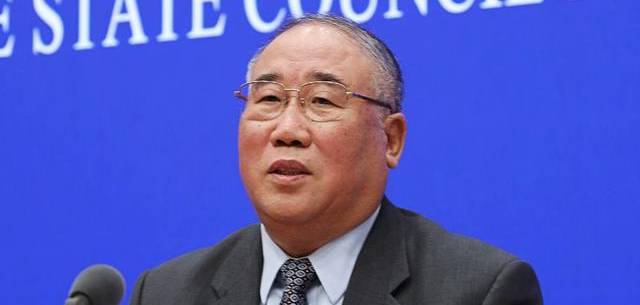
The United States and China hit a sticking point less than two months before the United Nations climate summit in Glasgow next November.
Beijing rebuffed calls from Washington to make its pledges to tackle carbon emissions more public and ambitious, saying the U.S. government could not expect cooperation in this area while remaining staunchly opposed to China on d 'other issues such as human rights.
"China already has its own plans and roadmaps to meet its climate goals," Chinese leaders told US climate envoy John Kerry this week, according to a South China Morning Post (SCMP) report.
The stalemate between the two superpowers - and the world's biggest polluters - comes in the final weeks ahead of COP 26, the UN conference to be held in the UK in November.
The climate negotiations are widely seen as crucial and bring together all hopes of keeping global warming to a maximum of 1.5 ° C above pre-industrial levels.
After the United States exited the Paris Agreement - the international agreement to keep global warming within safe limits - under the Trump administration, China played a bigger role on climate issues on the stage global.
The latter is a world leader in the production of solar panels and wind turbines for renewable energies, and overtakes the United States in the electric vehicle market.
At a White House climate summit earlier this year on Earth Day, Chinese President Xi Jinping was the first world leader to speak after Biden.
Mr. Kerry negotiated the 2015 Paris Agreement as Secretary of State to President Obama and has a long-standing relationship with his Chinese counterpart, Xie Zhenhua, whom he met this week in Tianjin.
In a joint declaration on the climate crisis in April, the United States and China pledged to continue discussions at the forefront of COP26 and, after the summit, to establish firm plans to reduce emissions at during this decade.
While the two countries agree the climate crisis must be addressed, China says the United States cannot be expected to work on the issue in isolation. For example, the US government has imposed strict sanctions on officials in Hong Kong and China due to Beijing's crackdown on the city with sweeping national security legislation.
"America would like cooperation on climate change to be such an 'oasis' in China-US relations," Foreign Minister Wang Yi told Kerry, according to The Associated Press. . “However, if the oasis is completely surrounded by deserts, then sooner or later the oasis will be deserted. "
Following the virtual meeting with China's Foreign Minister, a spokesperson for the US State Department said Secretary Kerry said the United States remains committed to cooperating with the world to deal with the the climate crisis, which must be approached with the seriousness and urgency it demands, and has encouraged China to take further measures to reduce emissions.
Mr. Kerry also had video meetings with Foreign Policy Advisor Yang Jiechi and Vice Premier Han Zheng, one of the seven members of the ruling Communist Party's all-powerful Politburo Standing Committee and head of a committee. developing a plan to meet China's emission reduction targets.
Mr. Kerry told Mr. Han that there was “no way” for the world to resolve the climate crisis without “the commitment, and the full commitment” of China.
After the meetings, Kerry said while his tenure is climate-focused, he would convey China's concerns to President Joe Biden and Secretary of State Antony Blinken.
President Biden announced in April a new US target of achieving a reduction of up to 52% from 2005 greenhouse gas pollution levels by 2030. He vowed to put the country on track zero net emissions by 2050 at the latest.
The target is not binding but nonetheless symbolically important, and gives the United States a renewed position of credibility from which it can pressure other countries to increase their targets.
China has pledged to be carbon neutral by 2060 and has pledged that coal use will start to decline after 2025 - although the country currently generates nearly two-thirds of its electricity from fossil fuels.
The United States produces about 15% of the global carbon dioxide emissions that choke the planet. China produces around 28%.
The bilateral talks come as the United States has just painfully experienced severe impacts from the climate crisis, including prolonged wildfires in the western United States and catastrophic floods and tornadoes caused by the Hurricane Ida in the east.
Dozens of people were also killed this summer in China when catastrophic floods hit a number of major cities.
Posted on 2021-09-08 17:51








Comments